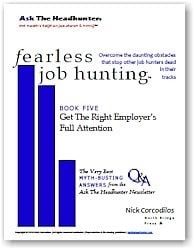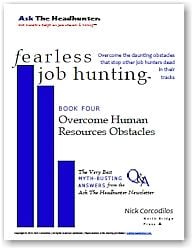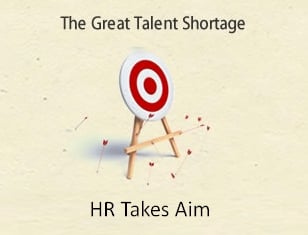In the June 12, 2012 Ask The Headhunter Newsletter, a headhunter asks a candidate to remove contact information from a resume before submitting it. Is that normal?
I was contacted by a headhunter about an opportunity. I was asked to provide a resume in Word format. I said I could not, and instead I provided a PDF version so that I could ensure the visual appearance is what I want it to be. Then the headhunter asked me to remove my contact information, but said a PDF version would be okay. I was assured that this was normal, but I wonder about this.
I spoke with the recruiter once after this happened, and we had contact just once more by e-mail. It has been three weeks since our last contact. The recruiter has not returned three voice mails or responded to three e-mails.
What do you think is going on? Do you think my qualifications threw the client or the agency off?
My Advice
 This is a classic example of how most headhunters operate. What people don’t know is, these headhunters don’t create resumes for their candidates. They take what the candidate gives them and merely pass it along to their client. This doesn’t add any value to the recruiting process. There’s an insider technical term for this practice: “throwing spaghetti against the wall.”
This is a classic example of how most headhunters operate. What people don’t know is, these headhunters don’t create resumes for their candidates. They take what the candidate gives them and merely pass it along to their client. This doesn’t add any value to the recruiting process. There’s an insider technical term for this practice: “throwing spaghetti against the wall.”
Headhunters who work this way are wasting your time and their clients’ time. This isn’t recruiting. This is dialing for dollars, also known by yet another technical term: “dumpster diving.”
The worst of these headhunters will bundle any and all resumes they can get their hands on, and send them along to an employer who might pay them a fee. This means the personnel department must sort the incoming drek, just like they sort resumes they buy from job boards. The headhunter adds no value to the process, and any HR department that accepts such resumes should be closed down.
Adding value
A good headhunter doesn’t just find candidates for a client company. A good headhunter interprets how a particular candidate can help the client get a job done. The headhunter carefully interviews the candidate and maps the candidate’s abilities and skills against the requirements of the position. As I explain in How to Work With Headhunters… and how to make headhunters work for you, when I’m done interviewing a candidate for my client, I’ve got all I need to produce a simple, clear, and very compelling resume. It’s exactly what my client needs prior to interviewing the candidate. If the candidate doesn’t match the client’s requirements, why would I even refer the person to my client?
Do you see the problem? The headhunter you’re dealing with is merely pumping resumes into an employer’s sorting process. The headhunter is not carefully assessing and judging you, to ensure he’s sending only qualified candidates to his client. What I’m really saying is, if that headhunter had truly interviewed you, he wouldn’t need your resume. He could and should write a custom resume for you and then present it — with your permission — to his client.
Did the headhunter really interview you?
That’s not to say that the resume you wrote isn’t useful. The headhunter can use it to fill in the blanks surrounding key facts he’s learned by talking with you in depth. But if the headhunter just forwards your resume to the employer, he’s not contributing anything to the recruiting task. He’s not highlighting the specific skills and abilities that prove you’re a good candidate for the job. A smart client demands this from a headhunter — the client wants to know why you would be a good fit. And the fact is, there’s just too much stuff on a resume that a hiring manager doesn’t need to know about you. The headhunter’s job is to demonstrate the match, not to dish the spaghetti.
So this is how you can tell a really good headhunter from a dumpster diver: Did the headhunter conduct a thorough interview with you?
What (most) headhunters do with resumes
The headhunter you’ve described wants your resume in Word format so that he can delete your name and contact information. (A PDF version from which you’ve omitted that information is just as good to him — it’ll save him time.) He doesn’t want his client to know who you are until the client promises a fee before interviewing you. If the headhunter had a solid, healthy relationship with his client, the headhunter wouldn’t be worried about the employer going around his back. That’s why the headhunter wants to control your contact information.
 Whether it’s a modified version of the resume you provide, or a new one the headhunter has written, you should always ask to see the document the headhunter will send to his client. You don’t want to defend resume errors in an interview. If you trust the headhunter, a Word version might be best to facilitate his editing it. But if you don’t trust the headhunter, or don’t know his practices, your PDF policy is a good one.
Whether it’s a modified version of the resume you provide, or a new one the headhunter has written, you should always ask to see the document the headhunter will send to his client. You don’t want to defend resume errors in an interview. If you trust the headhunter, a Word version might be best to facilitate his editing it. But if you don’t trust the headhunter, or don’t know his practices, your PDF policy is a good one.
Splat!
This is how the game is played by many headhunters. Learn to judge headhunters by whether they actually interview you in depth. If they don’t, then they’re not going to present you properly to their client, are they? What I think is going on in this case is that the headhunter is throwing spaghetti against the wall — and yours didn’t stick.
Do you give your resume to people you don’t know — headhunters and/or employers? If you do, I think you’re nuts. You’d have better odds playing the lottery. Have you ever met a headhunter who thoroughly interviewed you even before requesting your resume? If you’re a manager, do headhunters splatter resumes on your wall — stuff that’s not even recognizable as a “right” candidate?
: :












